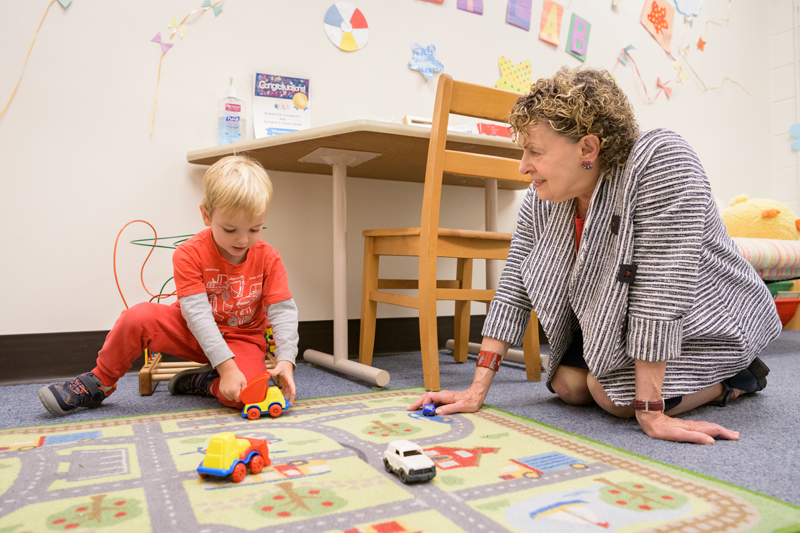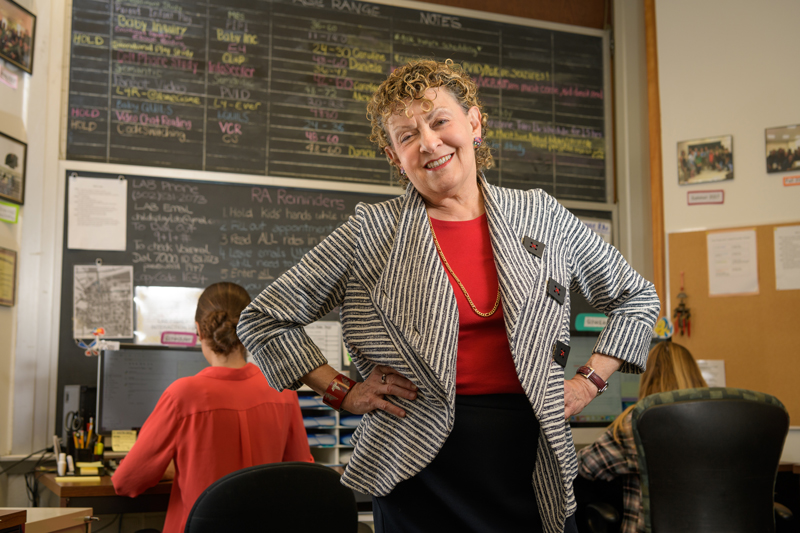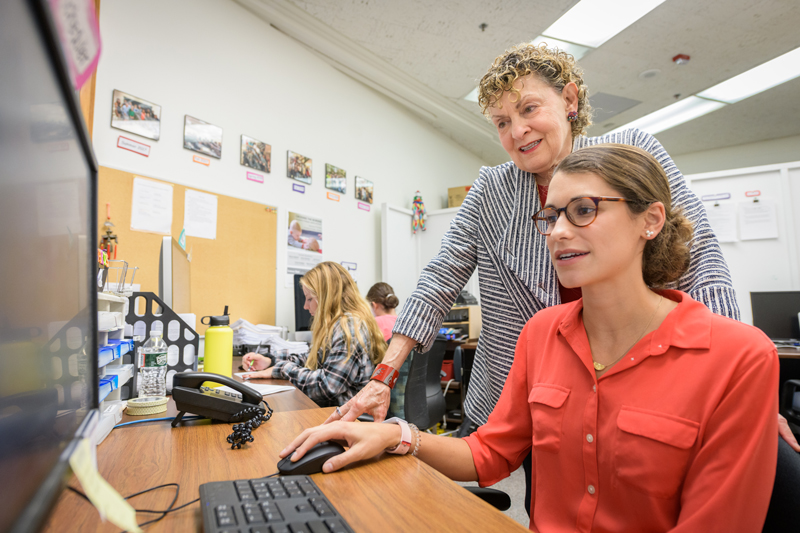


Your baby is a genius
Photos by Evan Krape October 18, 2019
A pioneer in early childhood and infant learning, Roberta Golinkoff wants children to play more
Did you know your baby is a genius?
It’s a serious question, one that University of Delaware professor Roberta Michnick Golinkoff has been asking parents since she arrived on campus in 1974 and established the Infant Language Lab, since renamed the Child’s Play, Learning and Development Laboratory.
When Golinkoff looks into the eyes of infants, she doesn’t see blank slates waiting to be filled with information. Rather, she sees brilliant minds actively analyzing the world around them, decoding the sounds and rules of language. Infants are learning words by six months even though they're not going to say anything until at least one year old. They can also identify patterns and calculate statistics.
We know this because of research methods pioneered by Golinkoff. In the lab, Golinkoff and her team of research assistants use facial monitoring to determine how well babies understand relationships between similar concepts. For example, in one method babies will be shown two images, like a boat and a shoe, which is accompanied by audio that matches only one of the images, as in, “Where is the shoe?”
“We measure whether children look longer at the shoe or at the boat. If they understand, then they should look longer at the shoe than the boat,” said Golinkoff, currently the Unidel H. Rodney Sharp Chair and Professor of Education in the School of Education, which is within the College of Education and Human Development. Golinkoff is also a professor of psychological and brain sciences and of linguistics and cognitive science in the College of Arts and Sciences. “We have used this method to study word learning in children as young as 10 months of age.”
In other words, there’s a lot going on inside their tiny heads.
“We know how children learn best,” said Golinkoff. “Children learn best when they are engaged and active, and that's the kind of learning we have to create.”

In a time when most are standing on the shoulders of giants, Golinkoff stands apart as one of the giants. She's the award-winning author of 16 books, including Einstein Never Used Flashcards: How Our Children Really Learn and Why They Need to Play More and Memorize Less, and the New York Times bestseller Becoming Brilliant: What Science Tells Us About Raising Successful Children, both with coauthor Kathy Herschel-Pasek, distinguished faculty fellow at Temple University. She’s contributed to more than 150 scientific articles and delivers lectures all over the world. Not content to publish research only to be used by other academics, Golinkoff is prolific when it comes to sharing her research with the general public, including popular press books, a blog on The Huffington Post and appearances in numerous documentaries and interviews.
Golinkoff is acknowledged among her colleagues as a leader in the field. Her research has been funded by more than $8 million in external grants, primarily from the National Science Foundation and the Institute of Education Sciences (IES), the independent, non-partisan statistics, research and evaluation arm of the U.S. Department of Education. She’s also a Guggenheim fellow and the recipient of the American Psychological Association’s Distinguished Service Award, among a bevy of other impressive awards too numerous to list here.
To say that Golinkoff is busy would be an understatement. She talks fast, thinks even faster and rarely stays seated for more than a few moments. If in conversation she discovers you to be the parent of an infant or toddler, she'll have the phone number to her Lab in-hand before the end of the next sentence. Then she’s off to teach, or to the Lab, or to her office to mentor graduate students or write another award-winning book.
At the center of it all is her research, which has been steadily pulling back the veil to peer inside the infant mind.
Pioneer in 'play'
Golinkoff remembered vividly a newspaper article that convinced her that something was terribly wrong with the parenting ideals being sold to the public. The article was about young children who were unprepared to enter school because they lacked the fine motor skills necessary to hold a pencil properly. Most children acquire this skill by playing with crayons and markers, but somewhere along the line, the notion of “play” joined the ranks of other disdainful four-letter-words. Rather than let their children play, parents were hiring occupational therapists to teach their children how to hold pencils.
“Children weren't ready for school because they weren’t allowed to muck around,” said Golinkoff. “Children miss out when they don't get to play. They can't have every moment of their time structured.”
Unfortunately, that’s what Golinkoff saw happening all around her.
“The race to turn children into the most talented kids in their classroom begins even earlier than the crib — it now begins in the womb,” Golinkoff wrote in Einstein Never Used Flash Cards, with co-authors Kathy Hirsh-Pasek and Diane Eyer. “Magazine articles coax expectant parents to exercise during pregnancy with the promise that it will enhance their babies’ intelligence. Ads on the next page urge them to buy foreign-language CDs to play to the unborn children.”

Ever wonder if all those “educational” toys advertised on TV and online are scientifically proven to be effective? Or fancy digital apps that promise to teach your infant how to read at an unrealistically young age?
According to Golinkoff, most of these claims are just a bunch of bologna, and there’s no science to support parenting norms that overwhelm children with an emphasis on academic success. As it turns out, most kids simply don’t need all this extra stuff. They just need to play.
Rather than sitting children at desks to have information drilled into their brains, Golinkoff recommends “guided play,” where educators or parents introduce learning activities that help to foster curiosity. This might look like an educator transforming the classroom into a grocery store where each student plays a role. The children interact, learn to negotiate social situations and develop critical thinking skills all while engaging in more physical activity.
“How you play as a child predicts what you will become as an adult, and we have taken away many children’s opportunities to figure out what they like and who they are,” said Golinkoff. “It used to be the case that IQ ruled, but now the findings are showing that it’s not about IQ. It’s about social-emotional development, it’s about perseverance, it’s about executive function, and these are all the things that develop in the context of play.”
When Golinkoff was nominated for the Francis Alison Award, the highest faculty award at UD, letters of support claimed that she “altered our understanding of how children learn language and develop thought.”
“Play is really good for kids,” Golinkoff said in the 2018 documentary Kindergarten: Where Play and Learning Can Meet. “It's good for their social-emotional development, it's good for their physical development, it's good for their cognitive development.”
Professor and mentor
Under the direction of Golinkoff, the Child’s Play, Learning and Development Lab, located on the second floor of the Willard Hall Education Building, explores how children develop language and spatial skills. As director of the lab, Golinkoff oversees two lab coordinators, five graduate students, one postdoctoral fellow and 20 undergraduate interns. For these students, an appointment in the lab will provide them with real-world skills and experience that will make them more competitive after graduation.
One of those students is Daniela Avelar, who is pursuing a doctoral degree in education with a specialization in learning sciences. Avelar and Golinkoff are currently collaborating on an experiment tracking the emotional responses of four-year-old children during three reading scenarios: co-reading a physical book with their mothers, co-reading an e-book with their mothers or listening to an e-book independently.
The experiment is fascinating to behold. On a Wednesday afternoon near the end of spring semester, a mother and child enter the lab and are greeted by a happy lion carved out of yellow and orange construction paper. They call this the “Jungle Room,” and the kids love it.
To measure how the child reacts to each reading scenario, multiple cameras are positioned to track the child’s facial responses while a fancy FitBit known as an E4 multi-sensor bracelet measures heart rate and skin conductivity. All of this information will allow Avelar and Golinkoff to better understand the child’s emotional response to reading with a parent, or with an iPad. It’s an impressive research project for a graduate student.
“Roberta has high expectations,” said Avelar. “I know that she cares, and she wants to help me reach my goals and be well prepared for my future endeavors. It's a lot of responsibility, but she's also available to help and answer questions whenever I need her. I've learned to be even more organized and responsible than I was before, and more proactive.”
For Hillary May, who is enrolled in the same doctoral program as Avelar, Golinkoff was the deciding factor in her choosing UD above other schools.
“I’m still not sure whether I want to go into academia or industry, but Roberta’s name is recognizable by people in both,” said May. “She is accomplished in academia, but she also recognizes the importance of disseminating information to the public. That is something I really wanted in an advisor. I want my work to directly impact the issues I’m passionate about and the people affected by those issues.”
There’s a seriousness about the students working in Golinkoff’s lab. The spots are competitive, and landing one is an honor that can launch students into impressive careers. It’s also exciting for students to contribute to a major faculty research project. Students say they are grateful for the opportunity.
Golinkoff is also grateful. She said she knows that the research coming out of the lab would not be possible without the dedicated team of students who keep the experiments running on time and according to schedule. After all, training the next generation of educators is what brought her to UD all those years ago.
“I am so proud of our students and what they have accomplished,” said Golinkoff. “Even as students, they are stepping into leadership roles and working together for the common good. They are going to change the world, and that’s what I’m determined to help them do.”
Student opportunities in research
If undergraduate or graduate students are interested in joining Golinkoff’s team, they can get in touch with her at Roberta@udel.edu. If you are a parent and want to participate in her research, please email her lab manager Calla Pritulsky at CPritulsky@udel.edu.
Contact Us
Have a UDaily story idea?
Contact us at ocm@udel.edu
Members of the press
Contact us at 302-831-NEWS or visit the Media Relations website

